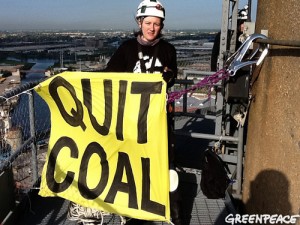Feel the Heat
By Kelly Mitchell
(Courtesy of Greenpeace USA)
August is no stranger to brutally hot temperatures. Slate Magazine runs a now-famous column every year, cursing this uncomfortable and – in their words – useless month. “August is the Mississippi of the calendar,” columnist David Plotz writes.
However, to anyone watching the weather lately, the crushing humidity of an August afternoon seems almost comforting in its predictability. From this year’s record flooding throughout the Midwest, to severe drought in Texas, to the unprecedented incidence of tornadoes throughout the South, extreme weather events are revealing how vulnerable we are to changes in the Earth’s climate. And while no single weather event can be linked directly to man-made climate change, the trends are disturbing. The world is getting hotter, and our weather, more extreme.
The news is grim, but this isn’t the time to retreat in despair. The scientific community agrees that if we start making sharp reductions in global warming pollution now, we can slow and reverse this tide. Individuals are ahead of the curve– we change our lightbulbs, we buy more efficient cars, and we install double-paned windows and low-flow showerheads. When we see images of polar bears stranded on shrinking ice shelves, we know something needs to change.
But the hard truth is that some people get to make decisions about how low to set their home thermostat, and others get to make decisions about how an entire country is powered. That latter group has demonstrated that they are not willing to take the necessary steps to protect our way of life from catastrophic climate change. Working hand in hand, our government and the coal industry are blocking a long-overdue climate solution.
Pollution from coal-fired power plants kills up to 34,000 Americans every year. These plants dump thousands of pounds of toxic mercury and other pollutants into the air and water, and are the largest source of global warming pollution in the country. Replacing coal power with clean, renewable energy is one of the most important and urgent steps the US must take to prevent the worst impacts of climate change. So, how is it that coal is still such a large part of our national energy mix?
It’s simple. Every year, the coal industry gives millions of dollars in campaign contributions to candidates for federal office, and spends hundreds of millions of more to convince the American public that coal is not dirty and dangerous. Industry lobbyists prowl the halls of legislative offices from small towns to Washington, DC, cutting deals with the people who are supposed to represent our best interests. Meanwhile, energy company executives pass along the true cost of coal– from asthma to climate change – onto innocent people, instead of investing in clean, safe power.
It’s time to quit coal and start an energy revolution. While you can start at home by using energy more efficiently, the most powerful thing you can do is to get involved in your community. Demand that your elected officials stop taking money from the coal industry, join local efforts to shut down aging coal plants, stage a protest or write to your newspaper. The leaders of industry and government need to hear a resounding cry that coal power has no place in our country – it’s time for them to feel the heat.
About the Author:  Kelly Mitchell is a Coal Campaigner for Greenpeace USA, based in Chicago. Since 2006, she has worked with citizen activists and organizations across the country to confront corporate polluters and transform US energy policy. Kelly grew up in Los Angeles and studied History at the University of Pennsylvania. Greenpeace is a global environmental organization that works to bring about positive change through action.[/learn_more]
Kelly Mitchell is a Coal Campaigner for Greenpeace USA, based in Chicago. Since 2006, she has worked with citizen activists and organizations across the country to confront corporate polluters and transform US energy policy. Kelly grew up in Los Angeles and studied History at the University of Pennsylvania. Greenpeace is a global environmental organization that works to bring about positive change through action.[/learn_more]


